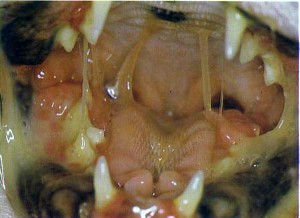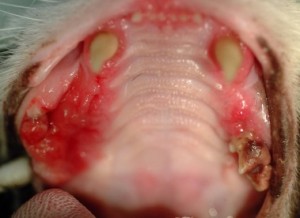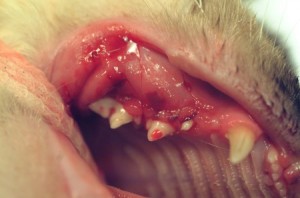What is stomatitis?
 Stomatitis\ˌstō-mə-ˈtī-təs\: any of numerous inflammatory diseases of the mouth having various causes. The classic signs of inflammation are pain, heat, redness, swelling, and loss of function.
Stomatitis\ˌstō-mə-ˈtī-təs\: any of numerous inflammatory diseases of the mouth having various causes. The classic signs of inflammation are pain, heat, redness, swelling, and loss of function.
Inflammation is a protective tissue response to injury, which serves to destroy, dilute, or wall off both the injurious agent and the injured tissues. Often, nearby healthy tissue gets injured as an innocent bystander. This sets off a repeating cycle of tissue damage followed by inflammation which in turn causes more tissue damage.
What causes stomatitis?
The short answer is no one really knows.
The long answer is that there are numerous possible causes. Some cats may have multiple reasons for developing stomatitis. The most common factors involved in diagnosing and treating stomatitis include:
Developmental disorders
 Genetics may play a role. Although any cat of any age, sex or breed may get stomatitis, Siamese, Abyssinians, Persians, Himalayans and Burmese seem to develop more severe symptoms.
Genetics may play a role. Although any cat of any age, sex or breed may get stomatitis, Siamese, Abyssinians, Persians, Himalayans and Burmese seem to develop more severe symptoms.- Juvenile periodontal disease starts as early as 5-6 months of age in Abyssinians, Persians, Maine Coons and Domestic Shorthair cats. This condition will look similar to stomatitis but only affects the tissue close to the teeth. Kittens with juvenile periodontal disease can be cured. If left untreated, the chronic inflammation sets the stage for stomatitis to develop. Adult cats with a history of juvenile periodontal disease should be monitored closely for signs of stomatitis.
Allergy
- Plaque intolerance is major cause of stomatitis. Plaque is a thin film which coats the teeth and tongue. It contains microorganisms and their byproducts (antigens). In a sensitive cat, that thin film interacts with the immune system in an abnormal way. The antigens in plaque are attacked by antibodies (infection fighters) and form clusters of debris that the immune system cannot completely remove. As this debris accumulates, the cycle of inflammation leads to tissue damage and more inflammation.
 Food sensitivity? The earliest cases of feline stomatitis were reported around 1973 about 20 years after commercial diets became popular in the USA. Some people feel strongly that commercially prepared canned or dry diets have created many of the oral health problems we are seeing in our cats. As a result, pet owners rely on home cooked meals and raw diets. A consultation with a board certified veterinary nutritionist is recommended in order to make sure that home prepared recipes are complete and balanced for the needs of your cat.
Food sensitivity? The earliest cases of feline stomatitis were reported around 1973 about 20 years after commercial diets became popular in the USA. Some people feel strongly that commercially prepared canned or dry diets have created many of the oral health problems we are seeing in our cats. As a result, pet owners rely on home cooked meals and raw diets. A consultation with a board certified veterinary nutritionist is recommended in order to make sure that home prepared recipes are complete and balanced for the needs of your cat.
Metabolic
Nutritional imbalances can weaken the immune system and periodontal tissues. Nutrients that play an important role in immune function include vitamins B6 and E, linoleic acid, zinc and selenium. Vitamin C is important for healthy gums.
 Neoplastic
Neoplastic
Stomatitis does not cause cancer. We do know that chronic inflammation damages DNA which creates an increased tendency to develop cancer. This is an important reason to be proactive in diagnosing and treating stomatitis.
Infectious
There are no bacteria or viruses that have been proven to cause stomatitis. There are several microorganisms that have historically been associated with oral disease.
- Calicivirus is one of two viruses responsible for upper respiratory disease in cats. Once a cat is infected, it will continue to shed the virus in saliva for its entire life. Symptoms of stomatitis are often worse when calicivirus is in the saliva.
- Feline Leukemia Virus (FeLV) and Feline Immunodeficiency Virus (FIV) make stomatitis very difficult to treat. Infected cats have worse symptoms and do not respond to conventional treatment options.
- Bartonella has nothing to do with stomatitis. It is not worthwhile to test for this parasite unless there is a risk of causing disease in immune compromised people.
Come back soon for information on the diagnosis and treatment of stomatitis in cats.




